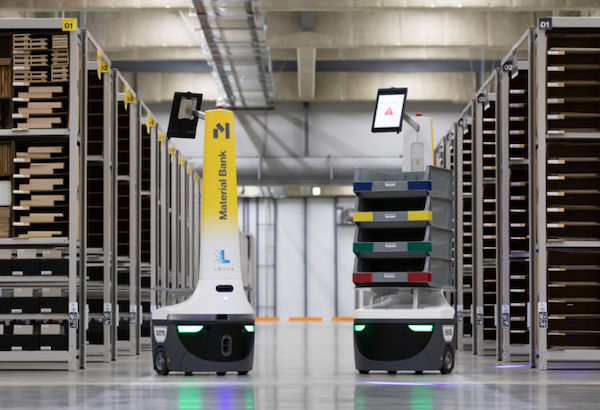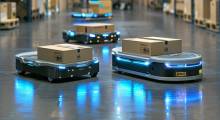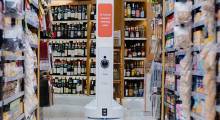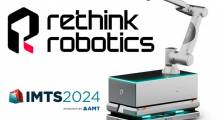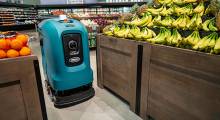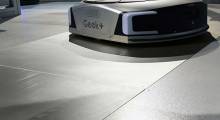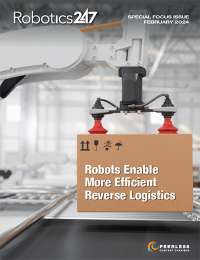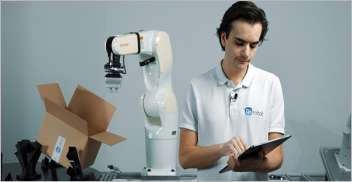Wilmington, Mass.-based Locus Robotics will be deploying its first autonomous mobile robots, or AMRs, in Japan to help connect builders with materials. DesignFuture Japan Inc. and Locus Robotics last week announced that they plan to deploy LocusBots in Material Bank Japan's distribution warehouse.
Founded in 2019, Material Technologies Corp. said its system combines a multi-brand cross-search and bulk-billing capability with established logistics facilities. It said this enables next-day delivery of orders placed before midnight to anywhere in the U.S. The company said it has handled building material samples for more than 100,000 participating designers and 450 manufacturers.
DesignFuture Japan is the Japanese arm of Material Bank, which claims to be “the world's largest marketplace for aggregating and sending out material samples.” Founded in 2021, DesignFuture Japan said it has been determining how to best connect local building materials manufacturers with architects and interior design professionals.
“The reason Material Bank in the United States has grown into a service used by 100,000 designers in just three years is none other than the fact that it greatly contributed to streamlining operations related to sample requests,” said Tsuyoshi Nakazawa, CEO of DesignFuture Japan. “Survey results show that designers in the United States spend nearly 40% of their time requesting samples, but in interviews with Japanese designers, we hear that they spend more time than that. We believe that how quickly we can deliver samples is also important for resolving industry issues.”
“Locus Robotics, which has built a strong partnership with Material Bank in the United States, supports the rapid and efficient logistics that make this possible,” he said. “We are very pleased to be able to start this demonstration project in Japan in collaboration with this company.”
Material Bank Japan automates for productivity, sustainability
Material Bank Japan said its marketplace provides designers with a free and efficient way to order samples. It also offers tools for building material manufacturers to directly communicate with designers about project proposals and sample requests.
Not only are Material Bank Japan's sample shipping trays designed to maximize construction quality, but they can also be used as a return box with sustainability in mind, said the company. In the U.S., designers request building materials from an average of four companies, so by replacing shipping from each manufacturer with bulk shipping from Material Bank Japan, the number of items shipped can be reduced by approximately 75%.
Locus and Material Bank Japan plan to deploy 25 AMRs to a distribution center in Ichikawa City, Chiba Prefecture. The companies said they expet the robots to increase the productivity of logistics and order fulfillment.
They added that the LocusBots will automate and streamline picking operations, improve working conditions, and enhance the customer experience for Material Bank Japan users. In addition, centralizing samples from multiple manufacturers in Japan could reduce environmental impacts, consolidating logistics and allowing for samples to be returned rather than sent as waste to landfills, said the companies.
DesignFuture Japan said it expects Locus' AMRs in the Material Bank Japan facility to double worker productivity over traditional fulfillment methods. With “virtually unlimited lifespan,” the LocusBots are engineered to be ESG (environmental, social, and governance)-friendly, the companies asserted.
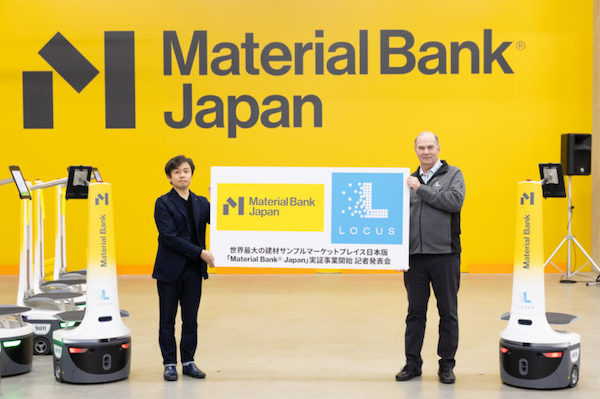
Locus Robotics builds on U.S. partnership with Material Bank
Locus said its multi-robot offering includes AMRs that collaborate with human workers to improve piece-handling, case-handling, and pallet-moving productivity while making efficient use of warehouse space. The company said it helps retailers, third-party logistics providers (3PLs), and specialty warehouses efficiently meet and exceed the increasingly complex demands of fulfillment environments.
This is Locus' first deployment in the Japanese market and the third country in the Asia-Pacific (APAC) region following recent deployments in Singapore and Australia. Japan represents the world's fourth largest e-commerce market, and an aging population and a growing labor shortage have increased demand for flexible and scalable automation, said the company.
“Locus Robotics is proud to partner with DesignFuture Japan and Material Bank, sharing our commitment to bring highly effective, scalable, and efficient robotics solutions to enable designers and architects in Japan,” stated Rick Faulk, CEO of Locus Robotics. “This partnership expands our existing U.S.-based relationship with Material Bank, bringing our innovative technology to the Japanese region for the first time.”
Locus said it currently operates more than 10,000 AMRs at over 250 sites in the U.S., Europe, and Asia. Its global customers include DHL Supply Chain, GEODIS, Radial, Ryder eCommerce, and VF Corp.
The company said it averages more than 3 million units picked per day around the world. In 2022, Locus surpassed over 1.3 billion units picked. It raised $117 million in Series F funding in November.
Last year alone, Locus Robotics won more than 17 industry awards, including being named to the Inc. 500 for the second year in a row. It also received a 2022 IFOY Award in the Automated Guided Vehicle (AGV/AMR) category.
How LocusBots will operate in Japan
Designers can place orders for samples of building materials through the Material Bank Japan website. The Material Bank warehouse management system (WMS) then assigns them to the Locus Robotics system.
Locus optimizes the orders and sends them to its LocusBots, which autonomously travel to each pick location in the 6,000-sq.-m (64,583.4-sq.-ft.) distribution center. Staffers work with the robots to pick the specific samples, and the AMRs then deliver them to the shipping facility for delivery to customers.
The workers place containers and sample boxes on the LocusBots' flexible and configurable platform. They simply follow the robots' onscreen display information to pick the sample(s) from the appropriate shelves and place them into the designated box. This eliminates unproductive walking time and reduces worker fatigue, said the companies.
The LocusBots can carry multiple orders or boxes at the same time, significantly increasing worker productivity, speed, and order accuracy, said Locus. Its user interface is also able to change to the worker's preferred language, further helping to ensure order accuracy, the company noted.
Article topics
Email Sign Up

